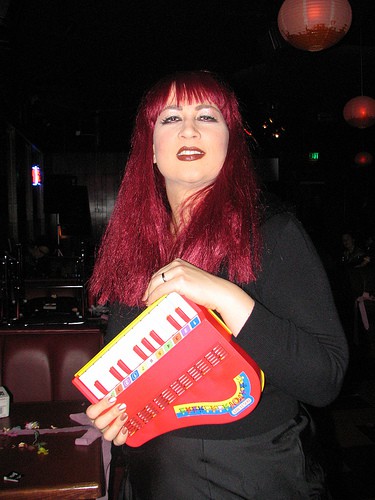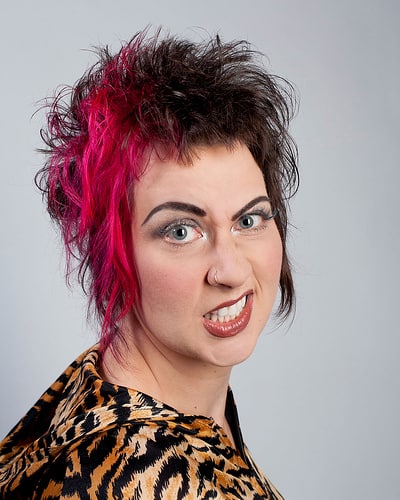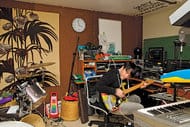Category: portland
My Own Personal Bridgetown Schedule!
Virginia Jones
Virginia Jones likes dancing, trivia, playing guitar badly, creating increasingly obscure Halloween costumes, and doing comedy. She will destroy you at Skee-Ball. She became a famous Portland blogger on accident.
She has appeared at the LAFF comedy festival in Austin, WICF in Boston, Bumbershoot in Seattle, and the Oregon Women’s Comedy Festival. She will go anywhere for a craft services table and a laminate. She’s performed at Book Klub, Good Luck, GIRTH, the Chatterbox, CRAVE, Competitive Erotic Fan Fiction, and Power Violence in LA, and many others. She has lived in LA for a year, and has made 5 friends and 286 Facebook friends.
She is the writer and star of the vlog series GOTHIXXX, in which two gothgirls share their dark world vision. It has literally dozens of views.
She has performed in venues from NYC to SF to Hong Kong, and recently someone recognized her at a Costco. She appears in Portlandia- Season 2 and in Jordan Brady’s documentary, “I AM COMIC.” Her mother is proud of her.
Shows with Virginia Jones:
- Tabor Lounge Opening Show
$ – Thursday, April 18, 2013, 7:00 pm @ Mt. Tabor Theater Lounge - White Owl Late Night
$ – Friday, April 19, 2013, 11:00 pm @ White Owl Social Club - CHAD Chats
$ – Saturday, April 20, 2013, 9:30 pm @ Eagles Lodge
Illamasqua Hates Sunlight, Loves Animals
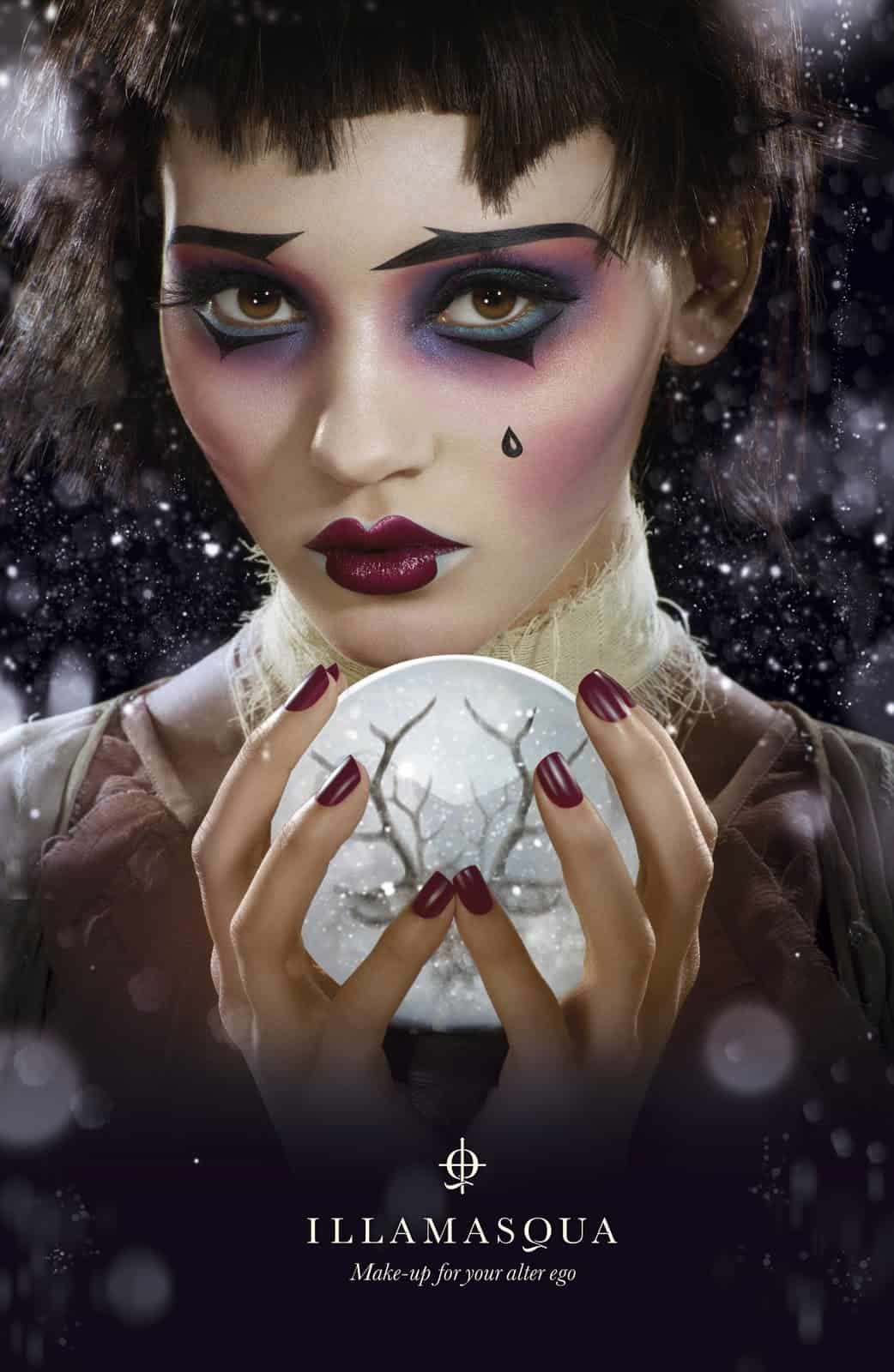
Illamasqua is not just the most gothity-goth high end fantasy makeup line in the market, they are also 100% free of animal testing, and have a large vegan offering. Let’s get fancy!

WELCOME BACK TO BRIDGETOWN!!!
Ladies and Gentlemen, Start your Freakout.
The 6th Annual Bridgetown Comedy Festival has announced its performer’s roster, and it is a doozy.
Headlining the show will be the incomparable genius Dana Gould, the incredible musician/comedian/charisma generator Reggie Watts, and the amazing Robert Popper and Peter Serafinowicz, responsible for the world’s best science show, Look Around You.
You may know Peter from Shaun of the Dead, or if you’re a little nerdy, the story of how John Lennon invented the Apple Ipod, The BeatleBox, or if you’re really beyond help, you’ll know him as the voice of Darth Maul.
Founding Father Matt Braunger is back, after another year of great shows, and an incredible hit film on Vine, “This is Ridiculous, Poor Pickles”, starring a bulldog being carried around like a sack of potatoes while Kyle Kinane yells in the background. Well, it was a hit with me.
Howard Kremer will astound you with his magic. Not literal magic, but comedy magic. He doesn’t do actual magic, because he’s not an a-hole.
Personal Hero Laura Kightlinger is on board, who has been funny and hot since it was fucking INVENTED.
Baron Vaughn talks faster than anyone can think. He is mind-melting.
Guy Branum is a GENIUS on the stage and a SHOWGIRL on the dance floor and a A LADY in the bedroom.
Kurt Braunohler is a very funny gentleman who’s only been in LA long enough to do one juice cleanse.
Eliza Skinner is smart and talented and my god she makes me laugh until my stomach hurts.
Bridgetown is excited and charmed to welcome back the amazing Todd Glass! We’ve missed him to PIECES!
Matt Kirschen came to us on Last Comic Standing, and will bring some more hi-larious international flavor.
Andy Haynes just got married to co-attendee Alice Wetterlund, let’s see if they’re still funny. They probably are.
Brandie Posey is back to kick ass, she’s a hilarious comic in El Lay, which we call Los Angeles, because we live there and stuff.
Robert Buscemi spends so much time telling me how funny he is, some of it has just got to be true.
Dave McDonough is a deadpan freak whom I had the honor of hauling around in my 96 Jetta when we competed in the Seattle International Comedy Competition together.
The Amazing Cameron Esposito is funny and charming and has amazing hair.
Stacey Hallal is a funny lady and we have been arguing about whether or not improv is funny for, like, four years.
Xander Deveaux is having his Bridgetown premiere, and he is very funny and will do the debutante bow thing where his forehead touches the floor. (postscript: he wound up being a very screwed up addict who attacked some persons and is persona non grata)
I’m honored and excited to be at my 6th Bridgetown!
Hey Ya! Song Interpretation
This was one of the biggest songs from the last decade, but do you know what lies below The Love Below? I’ll be interpreting songs at Book Klub, hosted by Doug Mellard and Sofiya Alexandra, every month at Stories on Sunset!
Baby Ketten Is High Art: New York Times
I know I’ve mentioned the majesty of Baby Ketten and its benevolent overlord, John Brophy, on this page, but finally the New York Times Magazine has given Ketten its due.
Shawn Records for The New York Times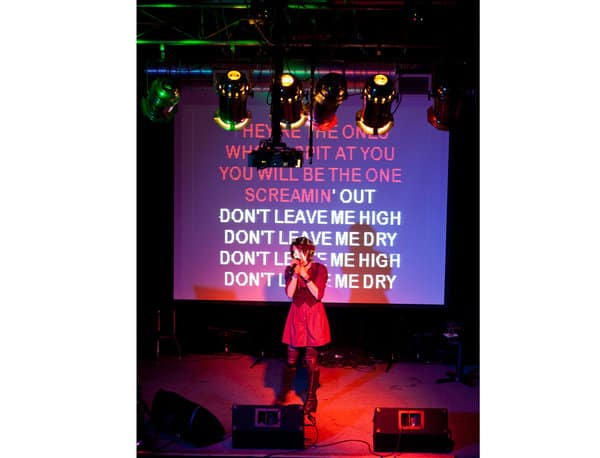
John Brophy, the mastermind of America’s greatest karaoke night, lives in a well-kept bungalow in a neighborhood of small homes in southeast Portland, Ore. When I visited on a weekday afternoon last spring, Brophy, then 36, wore a ringer T-shirt and dark jeans. His wrist was encircled by a half-dozen bracelets, and his dark hair swooped in front of his face. Like many Portlanders, he’s in a band, called Gingerbread Patriots, although currently the band is on hiatus — the “Shows” section of the Gingerbread Patriots Web site is empty but for the words “2009 will bring shows shows and more shows!”
John Brophy, the Baby Ketten K.J., at his Portland studio.
While his daughters, ages 10 and 15, did homework, Brophy and I sat on his bed in front of a flat-screen monitor as he showed me how he builds a karaoke track. Over the course of the next two hours, he would create a karaoke video for Radiohead’s song “Electioneering,” complete with snazzy graphics, Thom Yorke’s lyrics and Jonny Greenwood’s electrifying guitar solo, so that I could sing the song at the karaoke night he runs, Baby Ketten Karaoke. Rotating between private parties, bars and a pizza place, Baby Ketten is ecstatic, virtuosic and a little intimidating. At the center of Portland’s amazingly creative karaoke scene, it’s something close to a genuine artistic movement. And it’s ridiculously fun.
Every week, Brophy adds as many as 20 tracks to the Baby Ketten songbook. Some of these are songs he purchases from karaoke studios, not unlike any karaoke jockey, or K.J., in America. But many of them are songs hand-assembled by Brophy, much as he’s doing with “Electioneering” — B.K.K. originals that Brophy constructs either because the studios that recorded “official” karaoke versions did bad jobs, or because the song is such an obscurity that no studio has ever recorded a karaoke version. For example, if you’d like to sing Bikini Kill’s “Rebel Girl,” the Gregory Brothers’ “Bed Intruder Song” (with full Auto-Tune), Danger Doom’s “Sofa King” or Neutral Milk Hotel’s “In the Aeroplane Over the Sea,” Baby Ketten has them all. (I know: I saw people sing them.) Your local karaoke bar doesn’t.
To build his B.K.K. originals, Brophy scours eBay for old 45s with instrumental B-sides. He sometimes builds hip-hop songs by isolating the samples the original producers used and stacking them block by block, like Legos. He works on songs online with a network of like-minded D.I.Y. K.J.’s around the world. Sometimes, in a sound-dampened studio in his basement, he records whole tracks from scratch, playing the guitar and bass himself. He once drove himself crazy recording the bass for Joy Division’s “Transmission.” “That choppy bass at the beginning, I always thought it was early stuff, Peter Hook was unpolished, he was playing poorly,” Brophy told me. “But listening to it with headphones — it’s all intentional, he’s doing pulloffs.” He demonstrated on an air bass: “Dun dun dun dun dun dun dun dun dun dun dun dun,” pulling his left-hand fingers off the fret with every single eighth note, a staccato exercise that looked exhausting for three measures, much less a four-minute song. “I don’t play bass like that, but I had to get as close as possible. Well, I didn’t have to.”
To build “Electioneering,” Brophy started with a French studio’s rerecording of the song as his template, then spliced the actual Radiohead song’s instrumental intro and outro (featuring Greenwood’s solo) onto the middle section of the track, with a dozen deft clicks of the mouse. He Googled the song’s lyrics. Then he stretched, clapped his hands together and prepared to “tap it out.”
In order to tell the program he uses to highlight each word of the lyrics during playback — when the bouncing ball, as it were, should bounce — Brophy must tap each syllable of the song lyrics in rhythm. Perched on the edge of the bed, Brophy listened intently, his finger poised above the space bar, as the song filled the room. As Yorke sang each syllable — I go for wards you go back wards and some where we will meeeeeeeeet — Brophy jabbed the space bar. Watching his rhythmic tapping, each finger landing just a millisecond before the beat, I was reminded of his demonstration of the intricacies of Peter Hook’s bass. This is just another way of making music: the space bar a string, a computer with 16 gigabytes of RAM an instrument, the actual singer off in the future — me, the customer, who would later that week look to Brophy’s video to guide me through the song.
Every so often, a city becomes a crucible of innovation for a particular musical form: a place where circumstances conspire to create a very special creative flowering; where mad geniuses push one another to innovate further and further beyond where anyone thought they could go. Seattle, 1990. The Bronx, 1979. Memphis, 1954. These moments changed American entertainment.
But what if a musical revolution wasn’t in grunge, or hip-hop, or rock ’n’ roll? What if it was in karaoke? Is it possible that one of the most exciting music scenes in America is happening right now in Portland, and it doesn’t feature a single person playing an actual instrument?
You may recall when you were younger that many nights achieved, for perhaps an hour or two, a state of euphoria so all-consuming that the next morning you could only describe the nights as “massive” or “epic.” Adventures were had. Astonishing things were seen. Maybe you stole a Coke machine, whatever. You would toss off these words — massive, epic — casually at brunch, annoying the middle-aged people sitting nearby who were grimly aware that even as those nights become few and far between, the price you pay afterward in hangovers and regrets is significantly greater. (If you are younger, you may be in the middle of a massive night right now, in which case you should stop reading this article. Put down your phone and go to it! This might be the last one.)
For me, those few such nights I get anymore revolve around karaoke. Something about the openness required to sing in public — and the vulnerability it makes me feel — allows me to cut loose in an un-self-conscious way. It’s hard, anymore, to lose myself in the moment. Karaoke lets me do that.
But I recently moved to Arlington, Va., with two children, and so I rarely go out at night to sing (or do anything). We have friends in Arlington, but not the kind of friends we had in New York — not yet. I sing whenever I can on business trips, with friends I browbeat into renting rooms at trusty karaoke spots like BINY or Second on Second. But for quite some time, I’d been reading Facebook status updates and tweets from acquaintances in Portland that suggested the city was some kind of karaoke paradise — a place in which you could sing every night in a different bar, and where the song choices were so outlandishly awesome that you might never run out of songs to sing.
My mission in Portland was to see if this could possibly be true. Portland does have dozens of karaoke bars, and over the course of six nights we did our best to visit them all. I sang Lee Ann Womack in a honky-tonk in far southeast Portland, Kanye West in a comedy club and INXS in a Chinese restaurant. I watched Emilie, my seven-months-pregnant sister-in-law, sing Melanie’s “Brand New Key” onstage at Stripparaoke night at the Devils Point, a teensy, low-ceilinged club on a triangular lot well outside Portland’s downtown, while a topless dancer worked the pole next to her. Afterward, the dancer — whose bare stomach featured a tattoo of a vividly horrible shark and the word REDRUM — gave Emilie a sweet hug.
And one night, I went with Emilie, her husband and my wife to the Alibi Tiki Lounge, which advertises itself as Portland’s “Original Tiki Bar.” Inside, the crowd seemed at first to be the familiar karaoke mix of wannabes and birthday celebrators you might find in any bar in any city. Someone sang “Sweet Caroline” almost as soon as we walked in. A drunken birthday girl couldn’t handle the Ting Tings song she’d chosen, so the K.J. switched midtrack to Rebecca Black’s “Friday,” which was more her speed.
But an hour in, a goofily dressed group gave an impressively committed performance of a Tenacious D song, one of them growling and snorting like Satan so enthusiastically that several audience members in the front row became visibly uncomfortable.
When they were done, I walked back to their table, where I sat down next to a guy with long straight hair and a top hat. “We’re all musicians,” the guy, Gregory Mulkern, said. He himself is a professional banjo player. “But we really love karaoke because you don’t actually have to care at all.”
“Karaoke in Portland is just different from other places,” said his friend Bruce Morrison. “There’s a lot of showmanship.”
Mulkern swept his long hair over his shoulders and put his top hat back on. “People in Portland,” he declared, “are sillier than in other places.”
In the corner of the booth, a woman with dark-rimmed eyes and black lipstick leaned forward suddenly and took my pen from my hand. She wrote a phone number in my notepad. “Do you know,” she asked, staring intently into my eyes, “about puppet karaoke?”
Chopsticks III: How Can Be Lounge is located between a heavy-equipment rental shop and a Hanson pipe factory. It’s the kind of awful nightspot where if your watch was broken, you could keep time by the diminishing height of the melting heap of ice dumped in the urinal in the men’s room. When the heap of ice read 10:00, Chopsticks III was jammed with 50 people or more: groups of women out for a night away; a dwarf with an Afro who submitted his power ballads under the stage name Micro; a group of four buddies whose Monday-night karaoke club requires them to sing any song a friend challenges them to, blind. Also, a troupe of puppeteers from a local children’s theater, their snakes, ducks and cowgirls laid carefully across a table in the back of the bar.
This was puppet karaoke.
A puppeteer brought a long green boa constrictor onstage and sang “Steal My Sunshine,” which turned into “Sssssteal My Sssssunshine.” (The puppet’s name, I found out later, is Señor Serpiente.) A guy who looked just like Dick Butkus approached the microphone warily, unnerved by how big and puppet-heavy his audience was; when he sang “Drift Away” by Dobie Gray, we went wild, singing along to every word, clapping in time on the break. During the awkward karaoke fade-out at the end, he beamed. “You guys are awesome,” he said, then went back to the booth where he’d been sitting alone, nursing a beer.
A singer named Big Dan took the stage and tore into a guaranteed karaoke mood-killer, Drowning Pool’s nu-metal “Bodies.” But such was the magic of this night that during the song’s first verse, the puppeteers crept to the edge of the dance floor, and when the chorus hit — “Let the bodies hit the floor! Let the bodies hit the floor!” — they flung their puppets upward, the bears and cowboys and pigeons and fish all falling with little felten thumps to the ground. Big Dan, dressed all in black and even bigger than his name suggests, giggled so hard he could barely finish the song.
And me? I sang John Cougar Mellencamp’s “Cherry Bomb,” and dancers danced, and all through the song I thought about how relevant its lyrics (about how once upon a time we had fun, and now the kids laugh at us when we talk about the good old days) were so very relevant to my personal situation, the way you do.
Later, I drove downtown. The beer had long since worn off, but I still felt as if I were buzzing with the evening I’d just had. This was why I came to Portland. I needed to sing one more song, work one more crowd. My phone’s battery gave up the ghost just after valiantly supplying directions to the bar featuring Karaoke From Hell, a live band that has been backing amateurs in Portland for more than 20 years.
Inside the bar, a woman with a clipboard fended off all the requests of “Don’t Stop Believin’ ”; I slipped her 10 bucks and a few minutes later sang “Everybody Knows This Is Nowhere,” with a tight rhythm section behind me. I thought I could keep singing forever, but the song’s only two and a half minutes long.
“You mention karaoke,” Danny Coble, a Portland K.J., told me, “and most people around the country have a certain picture — a 50-year-old K.J. with a flowered shirt, and he does Elvis impressions.” But in Portland, karaoke has attained a certain level of cool, thanks in part to the fact that it’s less the province of drunken bachelorette parties and more the territory of born performers scratching an itch.
“Portland has arguably more bands per capita than any other town,” Coble said. “Lots of people have two or three bands. But there’s never enough gigs, or no one comes to your gig, or you don’t have a drummer right now — so the city’s filled with frustrated performers.” In Portland, that bottled-up indie-rock performative energy comes out at karaoke night, where inventive song choice and onstage charisma are prized.
“Karaoke makes regular people rock stars, and rock stars regular people,” explained Caryn Brooks, the communications director for Portland’s mayor. Sometimes the singers are actual rock stars. Brooks has a vivid memory of the time in the late ’90s when, at the original Chopsticks, she saw Elliott Smith sing Billy Joel’s “It’s Still Rock and Roll to Me.”
“I don’t want you to overlook the Japanese connection,” pointed out her boss, Mayor Sam Adams. (His term ended Dec. 31; he’s best known to fans of “Portlandia,” the IFC sketch-comedy show, as Sam, the mayor’s assistant.) “I believe we’re the smallest market with direct flights to Tokyo. We have 148 companies in the region that are Japanese-owned.”
“Also, we like a nice cocktail,” Brooks added.
Portlanders have a complicated relationship with “Portlandia,” but most everyone I talked to agreed that the show, with its hide-and-seek league, extreme locavores and put-a-bird-on-everything crafters, gets one thing exactly right: People in Portland are passionate about their weird pursuits.
“Portland attracts creative people,” said Katie Behrens, a die-hard John Brophy fan — a self-described Ketten — on another night. “And when creative people do karaoke, they look for ways to make it better.” We were all drinking a beer on my last night in town, warming up for a night of Baby Ketten at a pizza place on Mississippi Avenue. Behrens is 27 and an aspiring comedian. That night she was between jobs. She was exuberant about her relationship with all the Kettens and with John in particular — “My record is 10 nights in a row” — describing him again and again as not just a K.J. but also a supportive friend who makes her a better singer, a braver performer, a better person. “My second family is Baby Ketten,” she said. “I’m part of something special. And I don’t have to sit by myself.”
At the pizza place, John and a friend were setting up his custom light stands and speakers. I tossed a couple of bucks in his tip jar and signed up for “Electioneering,” the Radiohead song I watched him make at his house, then bought a round for our table. “Let’s call Justin to the stage,” John announced, “for something I’ve never done before.” We heard the unmistakable bass line to the White Stripes’ “Seven Nation Army,” but the song was playing noticeably slowly — perhaps two-thirds as fast as usual. We looked at Brophy, who shrugged. A tall young man in a puffy jacket swayed up onto the stage, then kicked into the lyrics — but instead of imitating Jack White’s rock ’n’ roll keen, he sang in a rhythm-and-blues croon. The song was instantly transformed from dirty garage rock to bedroom soul. It sounded incredible, as if the song were written that way in the first place. When it was over, Justin bowed, accepting our applause, then replaced the microphone in its stand and walked out the door, never to return.
After that, my performance of “Electioneering” was somewhat beside the point, but thanks to watching Brophy build the track, I certainly knew the song cold. It’s amazing what a difference a great sound mix makes — Brophy mixes singers from his board on the fly, and there was no mud or muddle in the sound, just pealing guitars and me, doing my damnedest to put on a show. As soon as I was done, I put my name back on the list for the song I’ve been waiting more than 20 years to sing, a song I love, a song that scared the hell out of me. My favorite ballad by my favorite band; a song I assumed would never, ever be available at karaoke, because it’s a feedback-drenched, near-indecipherable dirge: R.E.M.’s “Country Feedback.”
But it would be a while before the rotation got back to me. Brophy’s policy, designed to make sure as many people as possible get a chance to sing, is that new arrivals are moved to the front of the line, so for the next two hours I sat at our table and watched the weird and wonderful karaoke scene in action. The comics critic Douglas Wolk sang Trey Songz’s “Bottoms Up,” tearing ferociously into the Nicki Minaj verse. Katie Behrens sang Dia Frampton’s “The Voice” version of Kanye West’s “Heartless” but lost her voice on the bridge. (Everyone cheered for her anyway.) A short woman in a wool cap and wire-rimmed glasses rapped Ice Cube’s “You Can Do It” with one of the tightest flows I’d ever heard. “That’s my sister,” said the woman sitting next to me.
“My neighbors are junk dealers,” she continued. “Not junk like heroin, junk like junk. They sell junk out of their yard. It’s the most Portland thing.” Addie Beseda had the short haircut that seems more common on women in Portland than anywhere else I’ve been, and seemed remarkably lucid for someone who, self-reportedly, had been celebrating the first day of a new programming job since she left work.
“Here’s the important thing to remember about Portland,” she said. “No one’s here to get rich. Unlike everywhere else in America. There’s a critical mass here of people here following their passions. Oh, it’s my turn, hold on.” She polished off her beer, jogged up to the stage and began what was, by a wide measure, the most amazing song I heard in my Portland karaoke odyssey: “Prisencolinensinainciusol,” a 1972 epic written in gibberish by the Italian performer Adriano Celentano, supposedly to mimic how English sounds to the Italian ear. It is like four minutes of “Jabberwocky” with a Continental accent and a mod beat. The karaoke version is a Baby Ketten original, of course. Addie nailed every syllable, then high-fived her fellow Kettens all the way back to our table. “So, yeah,” she said. “People from Portland do stuff like that.”
Portland isn’t just the capital of karaoke, I was realizing. The Japanese influence, the small-business climate and the abundance of bands don’t really matter. Portland is the capital of America’s small ponds. It’s a city devoted to chasing that feeling — the feeling of doing something you love, just for a moment, and being recognized for it, no matter how obscure or unnecessary or ludicrous it might seem to the straight world. It is the capital of taking frivolity seriously, of being silly as if it’s your job.
At his booth, John Brophy cued up songs and cheered singers on and ran the lights and made everyone sound great. He is on a mission. In the week I was in Portland, he K.J.’ed two nights of public karaoke and two nights of private parties. The other nights he went out to sing at other people’s clubs. (At that honky-tonk, he sang LeAnn Rimes’s “Blue” so beautifully that I nearly wept.) Friends stopped by the booth to say a few words, request a track, buy him a drink, drop a dollar in the tip jar. All night long he smiled in the dark.
Much later that night, I finally sang “Country Feedback.” It was everything I hoped it would be. I closed my eyes and turned my back on the crowd and sank to the floor and went Full Stipe, really. It was the first time I ever truly felt like a rock star.
Closing time approached, and it was my last night in Portland, and I really hoped it might never end. We were all part of the show, and so we were all trying to find the perfect last song to sing. At 2:20 in the morning, I stepped onstage and heard the repeated piano pattern that begins LCD Soundsystem’s “All My Friends.” That’s how it starts.
John Brophy and the six remaining singers joined me up there, all six of them much younger than I, as the people who are out at 2:20 in the morning tend to be, and I felt a twinge of sadness that this would most likely be the last time I was out this late in a while, and we all danced wildly through the song’s six and a half aerobic minutes of ecstasy and regret, enthusiasm and embarrassment.
“I wouldn’t trade one stupid decision,” I sang, “for another five years of life.” As the song says, to tell the truth, this could be the last time. If I made a fool, if I made a fool, if I made a fool on the road, there’s always this. I have a face like a dad and a laughable stand and I can sleep on the plane and review what I said. I sang: “Where are your friends tonight? Where are your friends tonight? Where are your friends tonight?”
The End of an Era: So Long, Suki’s Comedy Open Mic!
Posted by Temple Lentz on Wed, Jan 23, 2013 at 2:03 PM
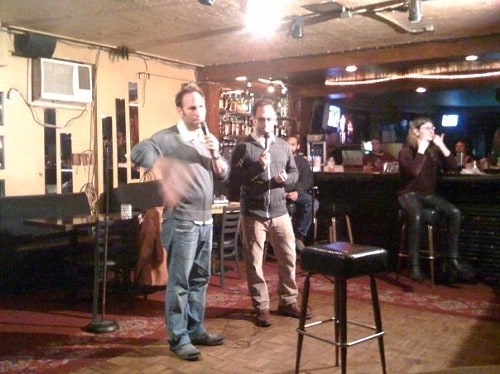
- Photo by Veronica Heath
- The Sklar Brothers performing at Suki’s open mic
On December 18, Suki’s Bar & Grill held its last comedy open mic. Sure, there are plenty of other mics in town, but the Suki’s mic had become somewhat legendary among both comedians and fans—for better and for worse. It was known as a really fun room, but also one that could be brutal. About a year ago, I was in a class with comedian Gabe Dinger, who told us that the Tuesday open mic at Helium is a great, really friendly mic. He could go there and have a great set and “get my ego good and inflated.” Then he could head over to Suki’s afterward “to have it crushed.”
Brad Stephens, a comic actor and bartender at Suki’s, started the open mic in summer of 2006, “Before there were 5,000 other mics in town,” and before Helium opened with their Tuesday mic. Shortly after starting, he asked Dax Jordan to host it. Jordan eventually moved on, and passed the hosting on to Jimmy Newstetter in March 2011. Newstetter says that the end of the mic was “amicable.” Changes in format and time, and the fact that the thing could sometimes stretch on for hours, had a lot to do with the decision to kill it. Says Newstetter, “Considering the steady decline of performers and patrons, I think it was just an easy business decision to replace it with karaoke.” Stephens confirmed that over the last number of months, “The bar just wasn’t making money on comedy anymore. In fact it was losing money. Everybody at the bar wants it to be successful. And even though a lot of comics took it personally, we’ve got to keep the doors open. If we can make comedy there successful again, the owners are open to it.”
And indeed, the open mic may have run its course but comedy at Suki’s isn’t gone for good. Stephens, Newstetter, and fellow comedian Whitney Streed are developing a regular comedy showcase that will offer something different from other showcases and keep comedy on the Suki’s stage, in a more sustainable way.
They’re still working out the details, but Suki’s management is on board with the show and, according to Streed, “We’ll have 4-5 local comics going up and getting suggestions from the audience on subjects to tell jokes about. They’ll get a subject, exhaust its humorous potential, and ask for a new one. The whole thing will close with everyone playing joke improv games like we used to play at the end of the open mic.” They’re looking at starting with a monthly show on first Sundays, beginning in March. Once things are finalized, says Streed, they’ll publicize it in February.
Although local comics and many comedy fans are glad to hear that there will still be some comedy at Suki’s, many are still a little sentimental about the loss of the open mic. Following are some memories and anecdotes about the local legend that was the Suki’s Tuesday open mic.
Brad Stephens, originator of the Suki’s open mic
I’ve seen prostitutes get punched, the Sklar brothers do a set randomly, Dax Jordan doing gay cowboy porn. I told jokes and they were terrible. I’ve seen pretty much every comedian in this town be groomed. Richard Bain was one of like four comedians there in the beginning, awkwardly sitting in the back and saying thank you to me for giving them free tater tots for showing up. I’m nobody in comedy but I feel really special that I started a mic that means so much to everybody else.
Dax Jordan, comedian and former Suki’s host
Being a hangout for local drunks and weirdos, as well as being beneath a hotel frequented by the VA’s and OHSU’s “families waiting for someone to die,” gave the night a funky vibe that occasionally broke out in violence. I and some other comics had to tackle an irate German visitor who ran the length of the room try and choke out Kyle Harbert, who escaped injury. I was close to the line of fire when Andy Wood made a joke involving race, and a patron facing away and sitting right at the bar just a few feet away from him, having only heard key words and not the whole joke, flippantly tossed a bottle of hot sauce over his shoulder at Andy and it shattered on the floor. That was pretty Blues Brothers for us.
Ira Novos retired here from Chicago, where he had a legendary status. He was like an awkward, keyboard-playing Borscht Belt relic who knew every song ever, so he became our in house musician. He played old west music for me as I developed what became a regular feature wherein I read the dirtiest, most ridiculous passages from an Old West period gay porn novel I found in the sound booth in my best Sam Elliott voice, index finger standing in as mustache.
Jimmy Newstetter, comedian and former Suki’s host
I believe Suki’s had a sense of chaos that made it feel like anything could happen. … In my opinion there is no greater comedy proving ground in Portland. If you can get a laugh at Suki’s, you can probably get a laugh anywhere. Not because you’re the greatest comedian in the world, but because you are capable of generating something worth noticing. I also truly believe (and this is a bit harsh, granted) that if you can’t get a laugh at Suki’s, then you probably shouldn’t be telling people that you are a comedian.
Virginia Jones, comedian
Suki’s was the second place I did open mic in Portland. This is typical, because the Boiler Room was the only open mic that had an ad in the Mercury stating that they had an open mic, so comics would start there, and they’d hear about Suki’s from other comedians, much in the way that people at AA meetings pass information to new people on the same journey.
Suki’s, with its hilarious combination of PSU students, comics, and real full-time die-hard alcoholics, was like performing in front of wild animals on a potent combination of synthetic opioids and speed.
Shelley Miller, comedy fan and supporter
I first went to Suki’s with Veronica Heath for her very first attempt at stand up comedy. That was in mid October, 2006 and I was hooked. I continued to go every Tuesday.Suki’s was always a place that comics came to perform and to network and socialize. I thought of the bar as being the family room of the Portland comedy community. It’s a wonderfully welcoming place with a friendly staff and a very eclectic group of regulars. Occasionally a nationally known comedian would drop by and do a quick set. My favorite was the night the Sklar Brothers did a set. Some of the best and brightest have started there and moved on. I’m very sad that Suki’s open mic is no longer. I am looking for another place to touch bases with my funny friends, but nothing is quite the same.
Whitney Streed, comedian
Suki’s has been a huge part of Portland since long before I started doing stand-up. I remember when I first started it was like this gauntlet that you had to pass through. Whether it was raucous or painfully silent, your set at Suki’s was likely to be soul-crushing, and I have spent more than one evening in tears in my car wondering what on earth I was doing with my life. But then sometimes this amazing thing would coalesce and somebody would become a giant: Richard Bain talking about Portland, Auggie Smith railing at the world, Dax Jordan reading gay cowboy porn. I remember Christian Ricketts and Jimmy Newstetter improvising some kind of canoe scene, I couldn’t even tell you what happened in it, but every single person in the bar was completely consumed with laughter. There’s a weird kind of magic in Suki’s that lets us transform the most base and average parts of our lives into something transcendent.
I’m quite sad that the Tuesday mic is going away. It feels like my parents just had to move out of my childhood home. So I’m excited to be working with Jimmy on producing a showcase there at the beginning of March, so at least comedy will continue to happen in some way in the space. I think it’s going to be a blast.
Veronica Heath, comedian
Some of the biggest events of my life started there. I did my very first open mic there in October 2006, so that’s where I fell in love with stand up, and I met my now-husband there over four years ago (he is also the daytime bartender there at Sukis!).
Sukis has so many memories for me that it is really hard to hammer down just a few. It was always awesome when a big(ger) name was in town for a show or Bridgetown and they would do the mic.
Ian Karmel, comedian
Doing stand-up at Suki’s was like doing stand-up in the back of a moving garbage truck, and if you can succeed in the back of a moving garbage truck, you know you’re on to something.
I think the idea that Suki’s represents is this notion of having fun and hanging out with friends without worrying so much about impressing anyone, or how your set went, or if your performance is going to affect how you’re booked. That spirit hung out at Suki’s, but it wasn’t owned by Suki’s, it was owned by the Portland comedians—and they, and that notion, aren’t going anywhere.
Belinda Carroll, comedian
Suki’s was a comic’s mic in the true sense of the word. Comics would come with brand new material and succeed—or bomb—and get feedback on the set. A lot of new comics did their very first sets at Suki’s. It was like a big comedy clubhouse. I think like everyone else, it’s a passing of an institution and we’re all sad about it. There will be other mics, but Suki’s legend will live on.

